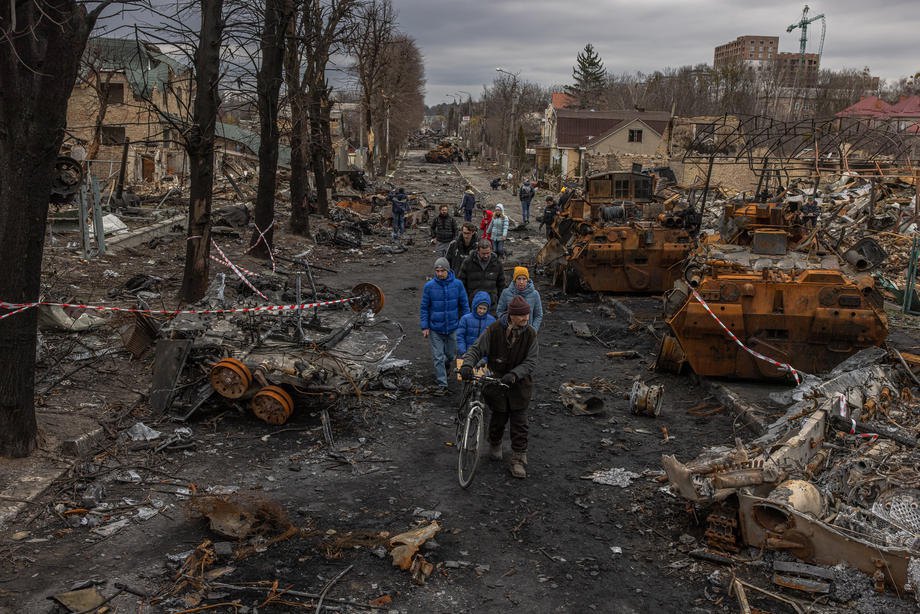
Now the city is gradually recovering from the shock, 1.5-2 thousand residents came home. But it is not yet an issue of returning to a normal, peaceful life. The city has not yet completely restored water supply, there is no electricity, the connection is out of order, shops and services are out of order. The food supply of residents depends only on humanitarian aid, and many of them still cook at campfires. In addition, the occupiers left a lot of mined cars and apartments, so the authorities requested the people to put off their return; it is just dangerous so far.
However, infrastructure problems will soon be solved, damaged buildings will be repaired over time, and new ones will be built on the site of the ruins. But it is unlikely that people will be able to forget what they had to get through.

City Council. "Everything is like the Maidan"
There are a little more than a hundred citizens in front of the City Council building. Since the liberation of Bucha, in addition to the authorities, the local Center for Administrative Services, the volunteer headquarters and the Red Cross have been operating here. The people are waiting for the start of operation, forming two lines. Some of them would like to apply to the city services with claims of Russian damage, and the others go to the Red Cross to receive the amount of 2 500 UAH, the aid for victims of the occupation.
Karina, the Red Cross volunteer (a Belarusian citizen who left the country for political reasons last December) requested the people to line up and make a corridor. She speaks in pure Belarusian and with intonations like the dictator's manner of communication from her homeland. People react inertly, and the Lukashenko's intonations sound louder.
Mykhailyna Skoryk, the adviser to the Mayor of Bucha, meets the correspondent of LB.ua in the building. She is our former colleague, a journalist from LB, now one of the leading coordinators of the local humanitarian headquarters.
"Everything is like on the Maidan," she says, pointing out the human crowd around her. - A mixture of representatives of authorities, volunteers and soldiers… Initiative chaos, a bit of anarchy, but everything is functioning and operating.
We are going to a meeting of the operators of humanitarian headquarters. The Mayor is holding the meeting for their leaders for the first time.
- Until now, everyone operated by his own, in his own direction, gathered in limited numbers, - Mykhailyna said. - But people are returning to the city, including the heads and employees of public utilities. There are already more than 150 of them. And the people need to see each other, to see that everything is operating.
The Mayor requested all heads of divisions and services to return to the city, she added. Otherwise, they will lose their job. The exception is for mothers with children. Some of them have already resigned on their own.
The staff meeting initially is like a typical executive committee. The Mayor lists the problems: there is no electricity, but the repairmen are operating; water was supplied, but not everywhere, "you can drink"; the biggest problem is communication, one Starlink is promised; gas supply is gradually restored…

But the meeting is not like the executive committee when they start talking about burial.
- The mortuary is overcrowded, we have to take the bodies from three mortuaries - the local one, from Kyiv and Bila Tserkva, - Anatoliy Fedoruk said. - It is necessary to arrange transportation of relatives who have to take the bodies away.
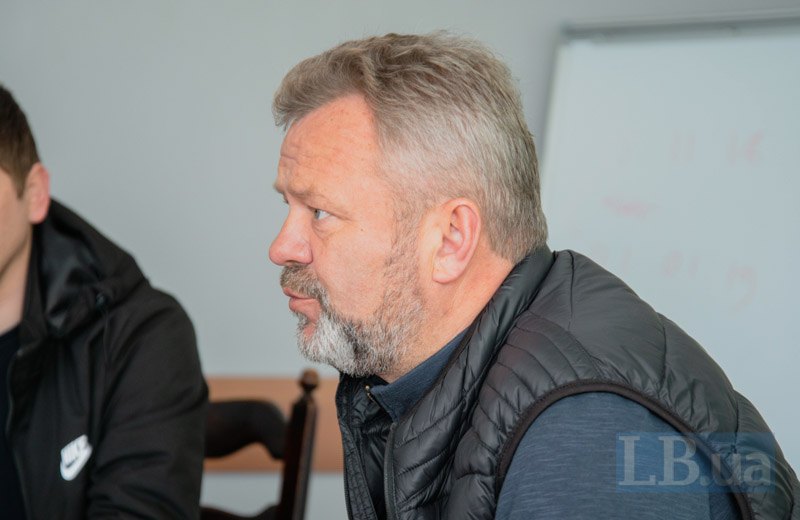
The Mayor raises his voice and harshly warns:
- Private companies, I mean all these third-rate companies, "Rest in Peace" and all others will no longer operate on the cemetery! Please tell it to everyone! The city will take all costs for coffins, crosses, digging graves. No speculations should be allowed. They behave (private funeral services. - LB.ua) like monsters. They require 20 000 UAH for a funeral – it`s unacceptable!
- Some of them require 40 kUAH and even 60! Someone of the audience added emotionally.
It is noticeable that this topic is painful for the people much more than the lack of electricity or water.
According to official data, 403 people were killed in Bucha. However, the search for bodies and their exhumation is still ongoing. The search also continues in other settlements of Bucha Territorial Community (besides of Bucha, there are the towns of Vorzel and Babyntsi and 11 villages: Blystavytsia, Buda-Babynetska, Voronkivka, Gavrylivka, Zdvyzhivka, Myrotske, Lubyanka, Rakivka, Sinyak – Tarasovshchyna - LB.ua).
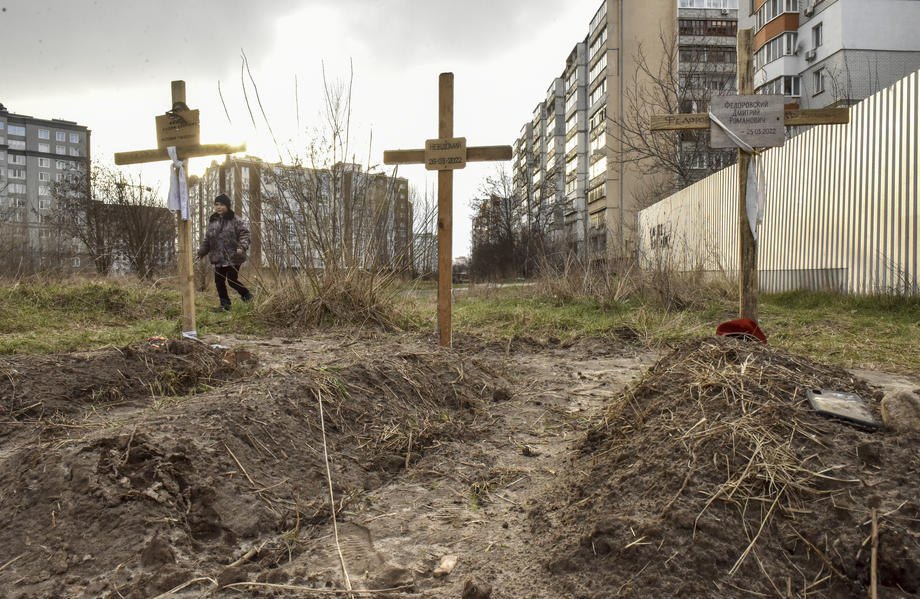
Most of those killed people were identified immediately, but there are bodies which can be identified only by DNA analysis. The samples are taken from all those killed people.
Finally, the head of the district Territorial Defense Forces makes a speech. He said that the Russians have dug up at least a thousand caponiers in the district (trenches to protect armored vehicles. - LB.ua), they need to be covered.
- They (Russian troops. - LB.ua) may return, - he warned.
After the meeting, Mykhailo Velychko from the local Territorial Defense Forces invited LB.ua to the party. Two loving couples from the local Territorial Defense Forces will get married in the neighboring Vorzel.

"It's a beautiful and symbolic story," he said.
In the corridor of the City Hall we troubled the Mayor for a moment.
- When, according to your estimates, residents will be able to return to the city?
- Residents will be able to return after the Great Victory, which we will definitely have, - he said. - The soldiers are warning about the threat from the north, it has not disappeared. If people return to the city, we can have (in case of military activities. - LB.ua) the same situation with the exit (evacuation. - LB.ua) of civilians. For the soldiers, of course, this is a great discomfort. We hope that people who have been forced to leave the city will be understanding of the ongoing processes.
At the same time the mayor admits: the city is filled with transport, people return home. However, it is too early to talk about capital expenditures: repairing damaged houses and building new ones.
- The country is in war. Aggression may happen again, - Anatoly Fedoruk warns. - Therefore we carry out only those operations which are important for life of the people who were in occupation, and those who returned home. We are restoring critical infrastructure.

Taras Vyazovchenko, a deputy of the Irpin City Council and a volunteer who coordinates the operation of demining groups, agrees that we should not be in hurry to return.
- Roads are already more or less demined in Irpin, Bucha and even further, on the Warsaw highway. But there are still many "surprises", mines in parks, near trees, under cars, - he says. - People who come now do not understand how dangerous it is.
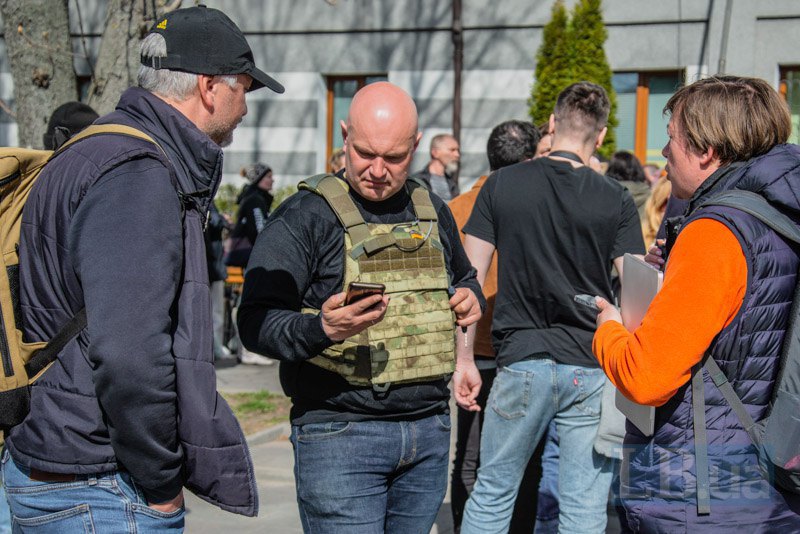
According to Taras, sappers need to check the private sector in the previously occupied areas, there may be tripwires:
- Apartments were mined, there were cases when leaving a mobile phone and hiding a "surprise" under it. If a person takes it, he may lose an arm. We found a car with a grenade under the seat. If a person moved the seat forward or backward, it would explode. The Russians also left many combat kits for mortars and tanks. Should you find something like this in the yard, please call the appropriate service, in any case, do not touch the shell yourself.
In one of the most densely populated areas of Irpin, the shell from the multiple launch rocket system "Grad" did not explode but stitched through the "Mercedes" and stuck between it and the ground. It is difficult to demine it because there is a risk that the explosion will destroy the surrounding multi-storey buildings, Taras said.
Meanwhile, on the street, prosecutors requested a volunteer from Belarus to remain silent for a while and asked the citizens to testify about Russian crimes.
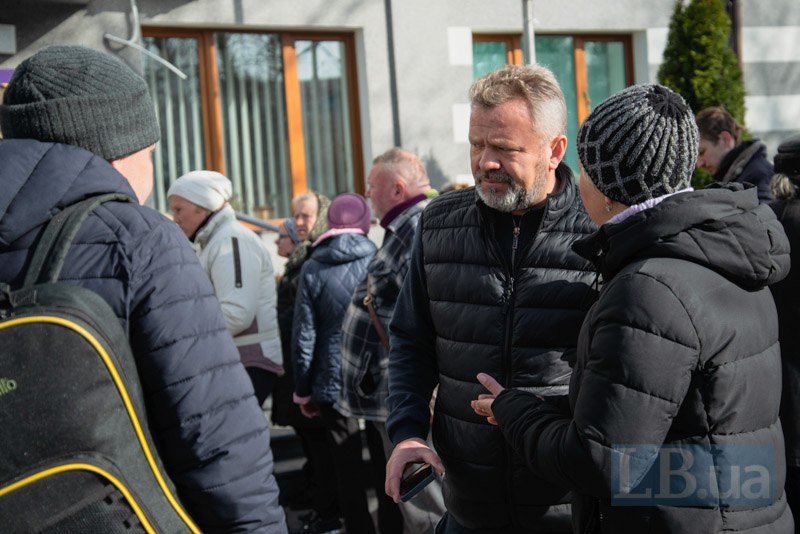
They are surrounded by people who waited in line before.
"I saw the bodies," the elderly woman said. "Did you see how these people were killed?" - the prosecutor specified. - No, I only saw the bodies. But I've seen a lot of them,” she insisted and asked to note her phone number. - I saw them being killed. I remember the faces of the four killers, I heard their names, - a man said emotionally who wore an uniform jacket of Irpin Water Supply Company. - I will never forget them.
Humanitarian hub. Lots of food, not enough helping hands

On the territory of Territorial Community, local authorities opened 25 offices for supply of food, medicine, clothing and household items. Some more offices were opened by Plast organization members, representatives of religious organizations. When the shops do not operate, the survival of people really depends on these offices.
According to Anatoly Fedoruk, the city is also forced to be involved in a logistics mission:
- Bucha is known all over the world, so a lot of aid is being sent here. At the same time, there are cities and villages that have suffered much more, and no one knows about them. That is why we have to receive and distribute this aid to all others.
We are visiting the Bucha Ukrainian gymnasium. Later, it was one of the best schools in the region, which was often entered in various rankings of the best educational institutions in the country. Now it is the largest humanitarian hub in the region.
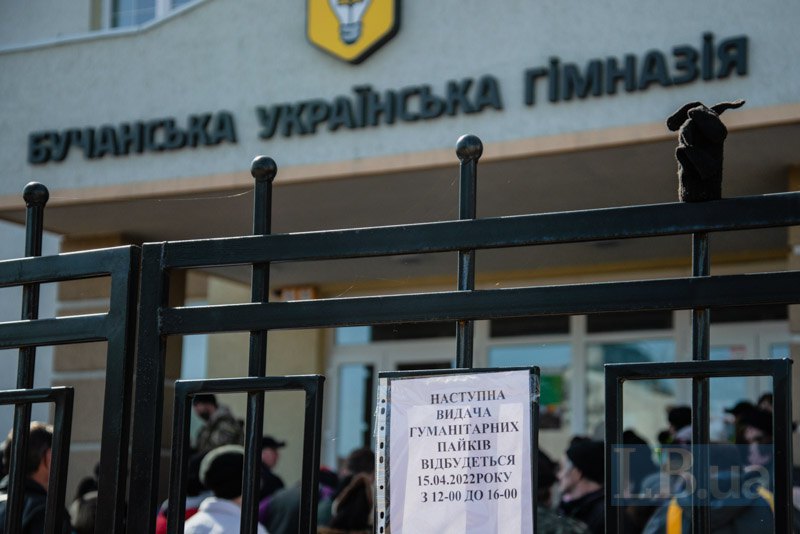
The people are waiting in line in the school yard to get some food. Many people are just waiting to charge their phones from the generators. Mobile communication is more or less stable, but there are still problems with the Internet, almost a basic need of modern people.
Representatives of a well-known Ukrainian chicken producer give fresh meat to the people.
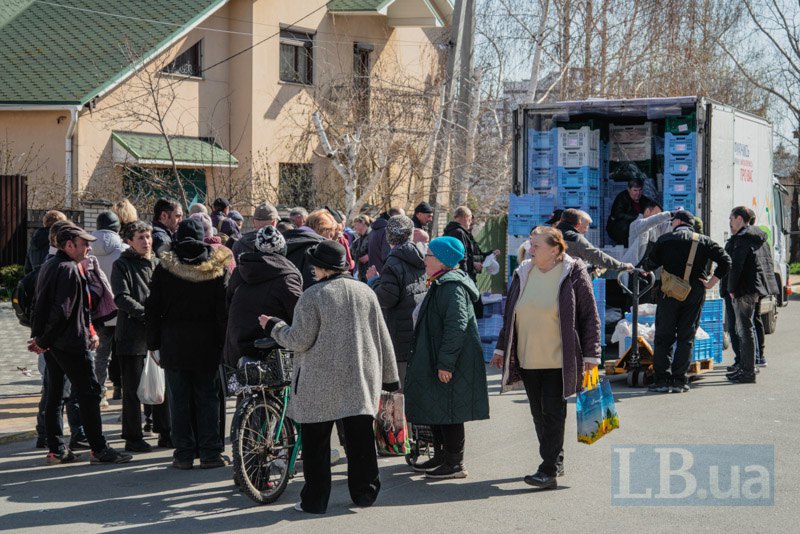
- Now there is enough food, - Mykhailyna said. – An indicative case was observed yesterday: a man refused taking the stewed meat and asked for oysters. He said that the neighbors got them yesterday and he also wanted to get them. This means that we have already met the basic needs.
The corridors and classrooms of the school are really filled with boxes, bags, various packages of food, household chemicals and medicines.
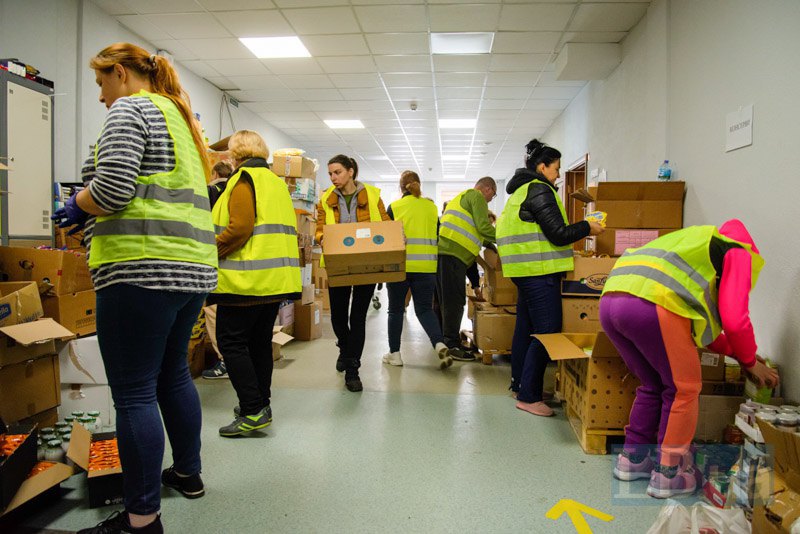
The biggest problem is sorting out the aid. The school now employs more than 50 city officials and the same number of volunteers, Oleg Tsymbal, the head of the hub said. He was before the head of the education department of the Bucha City Council. There is not enough of helping hands, especially skilled ones: doctors have to sort the medicine themselves.
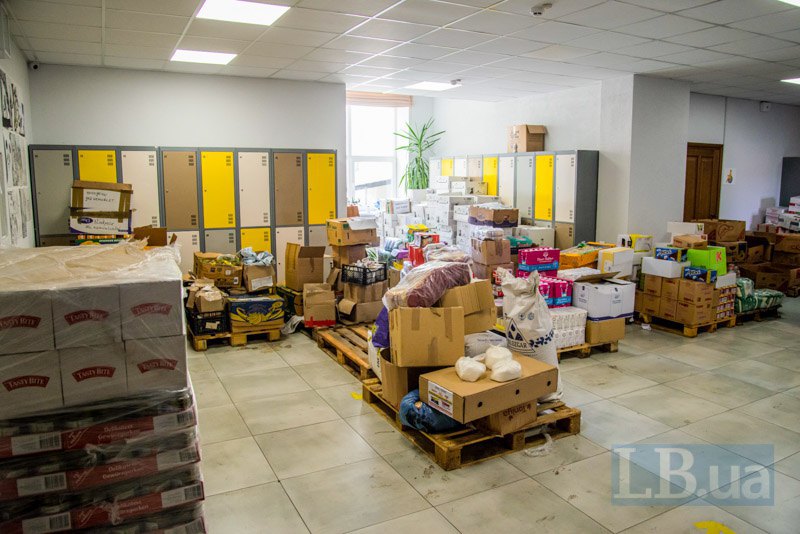
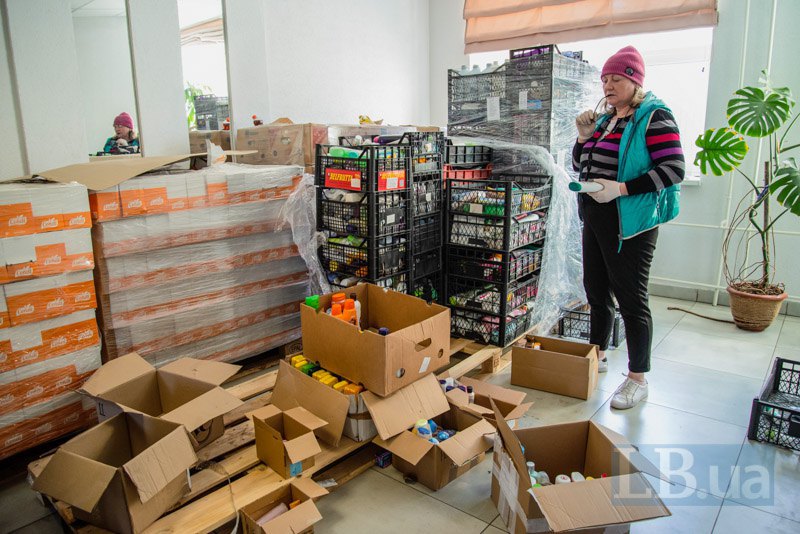
There are also products that need to be stored in refrigerators, but they do not operate due to lack of electricity and this can be an additional problem.
Volunteers are looking for someone who needs a large batch of baby diapers. Bucha was traditionally a town where young families with children lived but there is now almost no demand for diapers.

There are really very few children on the streets. Almost everyone I talked with said that they returned to the town already after its liberation.

We meet Yuri in the school yard. He is one of those who deliberately decided not to evacuate.
He remembers life under occupation in a few words, but with a smile.
- They (Russians - LB.ua) drove through the streets at night, and we switched the Ukrainian songs on - "Nese Halya wodu, koromyslo hnetsya". Then they started going crazy, they started shooting at us. They hated the Ukrainian songs very much.
-Did you talk to them?
- No! What should I talk to them about?
Finally, Yuri asked LB.ua to visit his neighbors. He said that a woman with three small children and a disabled mother lived nearby throughout the occupation. She unfolds the piece of paper where her phone number is indicated: - Here, please write it down. Go to them, please, because they need help!
Wedding during the war. Photo shoot in army camouflage
After visiting the humanitarian hub, we hurry to the neighboring Vorzel for the wedding ceremony. Two couples from the district Territorial Defense Forces are getting married at once - Tetiana and Maxim and Tetiana and Kostyantyn.


At the entrance to the church, two Kalashnikov automatic rifles were modestly left. The couples from the Territorial Defense Forces forgot to leave them elsewhere, and it was inappropriate to take weapons to church. However, the weapon is under close control.

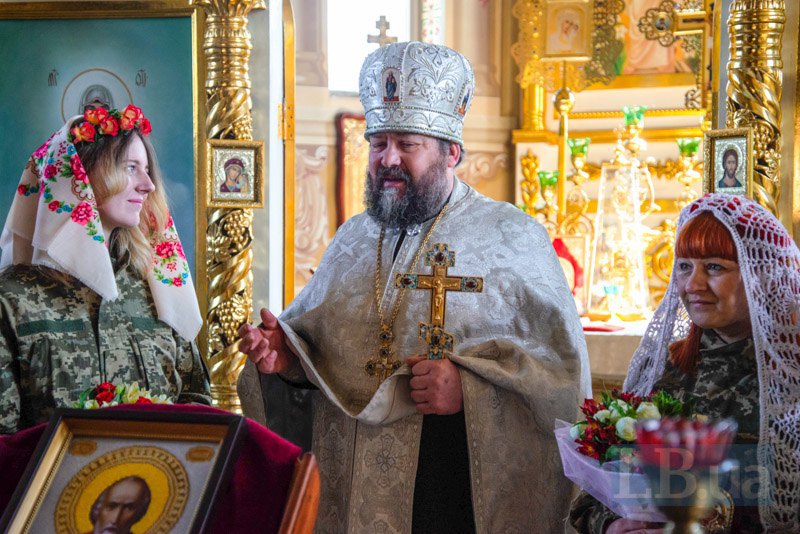
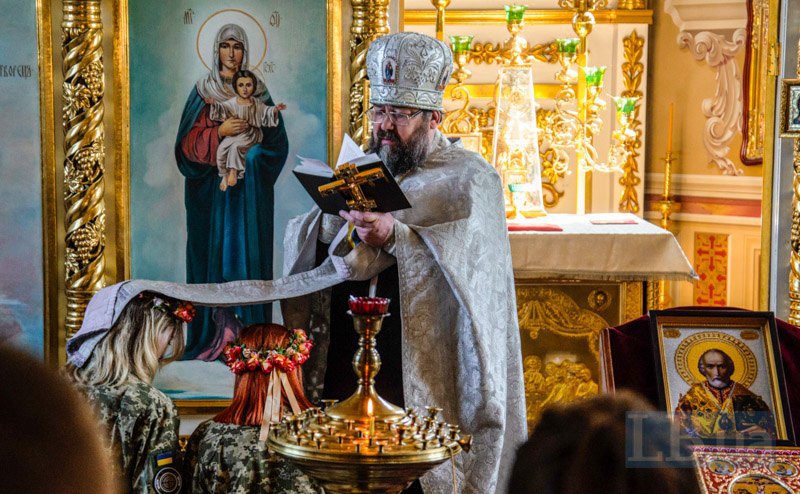



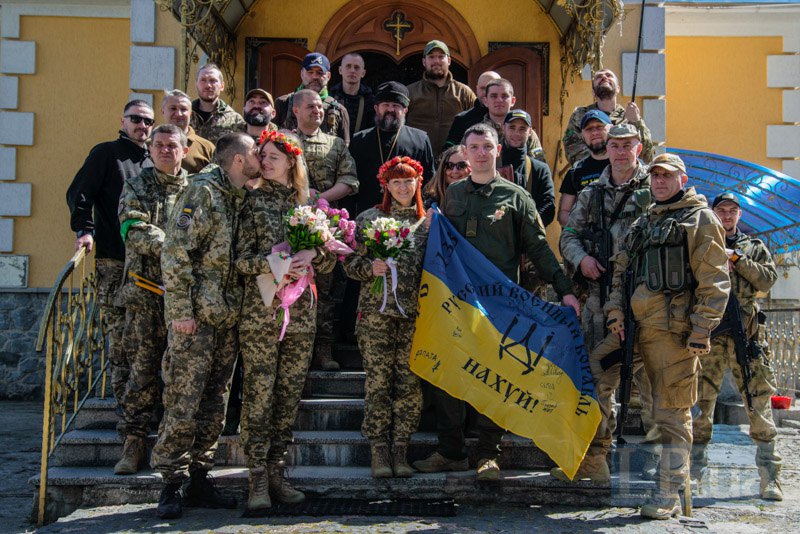

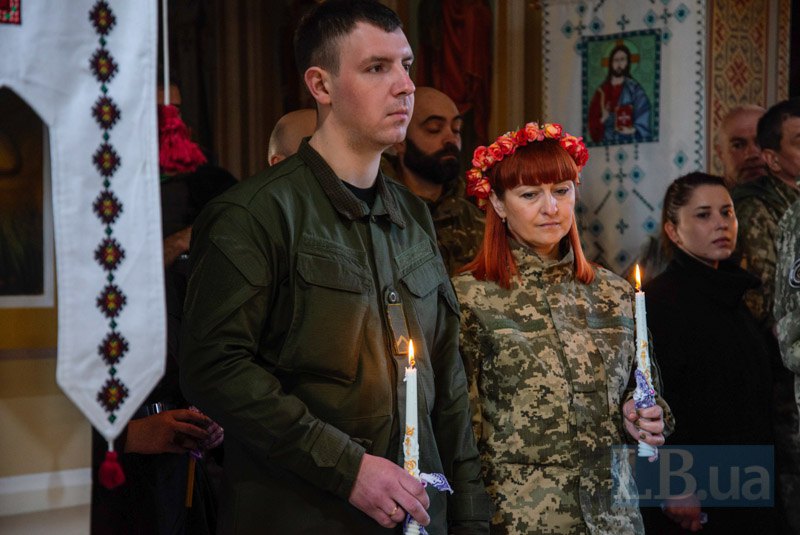
I will not describe the ceremony. Wedding photos and videos should be viewed; it cannot be described with words.
The wedding of couples from the Territorial Defense Forces could be the optimistic finale of the story about the city liberated from the occupiers and coming back to life. But we have to visit a large family which Yuri told about.
War and children
Before the visit, Mykhailyna loads groceries, cereals, baby food, bags of potatoes, canned food and sweets to the cabin of her compact Mitsubishi Colt and to the trunk.
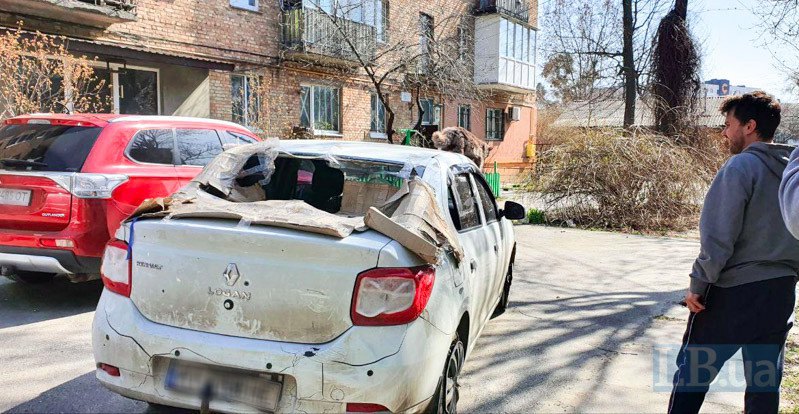
This is a strange case, she says, because volunteers are primarily looking for such families in need and almost all of them are already under control. But three small children is exactly the case when everything should be checked.
We found a modest four-story building at the address given by Yuri. In the yard there were a car shot from all sides.
- That was an evacuation car, Taras Vyazovchenko explains and squats down to see if the Russians have left another "surprise" under the car.
At this moment, a huge cat jumps out of the cabin through the broken back window and walks away without hurrying, not reacting to our "Kitty, kitty".
On the top floor of the house we find the right apartment. Knocking on the door, we are invited to come in. The door is not closed.
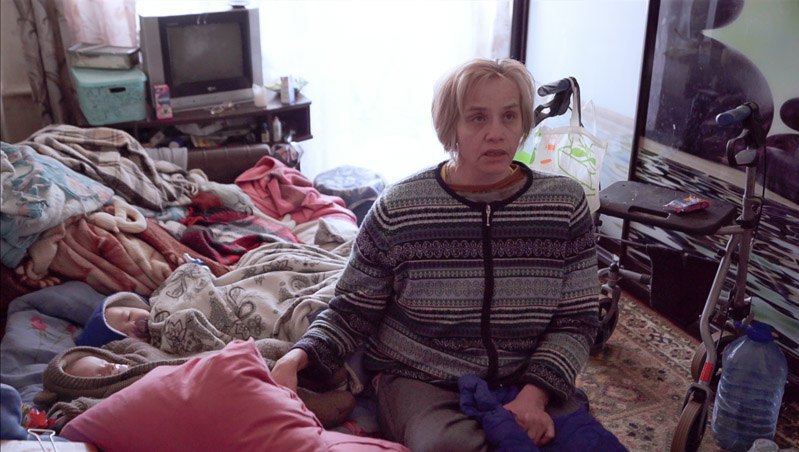
Valya meets us in a small room. On the cupboard above it is a Vasylkiv rooster, which has already become one of the symbols of the war. Next to the woman, two babies sleep on the bed. They are wrapped in numerous blankets and towels. They are her granddaughters - 4-month-old twins Emma and Mia.
Their mother, Lesya, went to the City Council with her eldest son David (two years and seven months old).
- When the Russians bombed, I covered them (babies - LB.ua) with my own body, - Valya mentioned. - But then I realized: if I will be the first (injured - LB.ua), I will suppress them with my body. My second daughter and granddaughter are in Irpin, their house was bombed.
- We couldn't leave in any way, I am disabled, I cannot go. My daughter can't push at once the baby carriage and my wheelchair. Our boy is hyperactive, - Valentyna explained. She added that their father was probably killed by the Russians. However, they have no confirmation yet.
- Are you ready to leave if we arrange everything? Mykhailyna asked.
- Of course.
The neighbors bring food, baby food and diapers, the woman said.
- The first ten days (battles in the city. - LB.ua) we did not eat anything at all. We had potatoes and tomatoes. But when they bomb, you only think about these babies surviving. ”Valya began to sob.
Her daughter has lost milk, switched to baby food, so they constantly need hot water, which they still have to heat in the yard on a gas burner, she added. - It was a gift from Maryna Poroshenko when visiting Bucha. Before, they had to heat water on the hearth.
"The babies were not bathed for almost two months," their grandmother complained. - How can we bathe them? It is cold, no water. How could we heat water, on the fire?
She recalled the days when the war was near to them.
- When the bombing started, we constantly held the babies in our arms and slept on the floor. The aircrafts were flying, the paratroopers were coming down, I thought they were going to land right on my balcony. They were running under the window, shooting ... My grandson still didn't speak. And now he knows: "Hide, they shoot." These are his first words.
The woman thought that she would go crazy. And even now, when the occupiers left, she is afraid of everything.
- Then we were afraid that someone would come in. We are two women, what will we do to them? We are still afraid even of cars. Cars start buzzing, and I am afraid in spite of the fact that I am a 59-year-old woman. I think that they are coming (occupiers. - LB.ua). We are now without electricity, gas, water and information.
"These babies saved us. My daughter and me think so," she said. - We sat with them on the floor, and the daughter said: "Mom, are they going to die? Will they die? ” But they survived…
Oleg Bazar, editor-in-chief of LB.ua.
Oleg Zakharov, Yevhen Garbarenko, Oleg Omelchenko, Vladyslav Kuznichenko, Vladyslav Samusenko also worked at this article.








